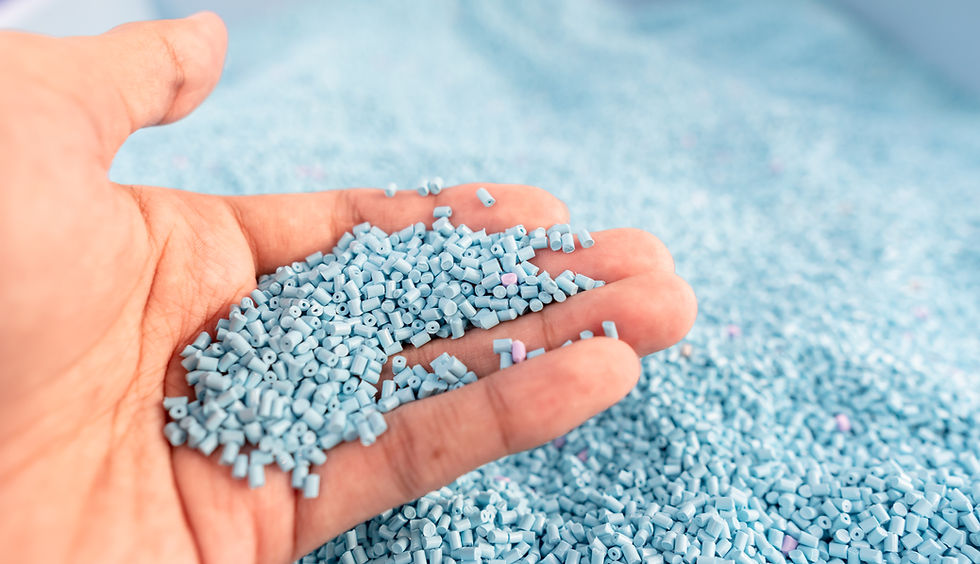10 Harmful Food Additives Banned in Europe but Still Allowed in the U.S.
- Noël King
- Mar 7, 2025
- 3 min read
Updated: Mar 17, 2025

Our food is filled with additives—chemicals that enhance flavor, extend shelf life, or improve texture. While the U.S. Food and Drug Administration (FDA) permits many of these additives under specific conditions, the European Union (EU) has banned several due to health concerns. From artificial dyes to toxic preservatives, these substances have been linked to cancer, organ damage, and neurological disorders.
In this post, we’ll explore 10 of the worst food additives banned in Europe but still used in the U.S. We’ll break down what they are, what foods they’re found in, and why they pose health risks. Let's get to it.
1. Brominated Vegetable Oil (BVO)
Used In: Citrus-flavored sodas (e.g., Mountain Dew, Sun Drop)
Why It’s Harmful:
It contains bromine, a chemical that can accumulate in the body and cause neurological damage, memory loss, and skin issues.
Linked to thyroid dysfunction and hormonal imbalances.
Banned In: The EU and Japan due to toxicity concerns.
2. Potassium Bromate
Used In: White bread, rolls, pizza dough
Why It’s Harmful:
It is classified as a possible human carcinogen by the International Agency for Research on Cancer (IARC).
Linked to kidney and thyroid tumors in animal studies.
It can cause oxidative stress, leading to DNA damage.
Banned In: The EU, UK, Canada, and China.
3. Azodicarbonamide (ADA)
Used In: Packaged bread, buns, tortillas, pizza crust
Why It’s Harmful:
Respiratory irritants are linked to asthma and lung issues.
When heated, it can break down into carcinogenic byproducts.
Banned In: The EU, Australia, and Singapore. (Singapore imposes a $450,000 fine and jail time for its use!)
4. Ractopamine
Used In: Pork, beef, and turkey to promote lean muscle growth
Why It’s Harmful:
Linked to heart problems, increased heart rate, and anxiety.
May cause neurological side effects in humans.
Banned due to concerns over animal welfare and food safety.
Banned In: The EU, China, and over 160 countries.
5. Olestra (Olean)
Used In: "Fat-free" chips, such as Lay’s Light and Pringles Light
Why It’s Harmful:
Causes severe digestive distress, including cramping and diarrhea.
Blocks absorption of essential vitamins (A, D, E, K).
Banned In: The EU and Canada due to health concerns.
6. Red 40, Yellow 5, and Yellow 6 (Artificial Food Dyes)
Used In: Candy, cereals, soda, sports drinks, processed snacks
Why They’re Harmful:
Linked to hyperactivity in children (some experts recommend avoiding them in ADHD diets).
Contains benzidine and other carcinogens in trace amounts.
It may cause allergic reactions in sensitive individuals.
Banned In: The EU has placed strict warning labels on products containing these dyes, leading many manufacturers to remove them.
7. Titanium Dioxide (E171)
Used In: Candy, chewing gum, processed foods, white sauces
Why It’s Harmful:
A potential carcinogen linked to intestinal inflammation and DNA damage.
It can accumulate in the body and impact immune system function.
Banned In: The EU in 2022 due to safety concerns.
8. Butylated Hydroxyanisole (BHA) & Butylated Hydroxytoluene (BHT)
Used In: Cereals, chips, preserved meats, butter
Why They’re Harmful:
BHA is classified as a possible human carcinogen by the IARC.
Linked to endocrine disruption, affecting hormones and fertility.
It may cause allergic reactions and liver/kidney toxicity.
Banned In: The EU, UK, and Japan.
9. Propylparaben
Used In: Baked goods, tortillas, dairy products
Why It’s Harmful:
Disrupts hormone balance, leading to reproductive issues.
It can mimic estrogen, increasing the risk of breast cancer.
Banned In: The EU and Denmark were prohibited due to concerns about endocrine disruption.
10. rBGH (Recombinant Bovine Growth Hormone) & rBST (Recombinant Bovine Somatotropin)
Used In: Dairy products (milk, cheese, yogurt, ice cream)
Why It’s Harmful:
Increases levels of insulin-like growth factor-1 (IGF-1), which is linked to breast, colon, and prostate cancer.
Causes health issues in cows, including infections and increased antibiotic use.
Banned In: The EU, Canada, and Japan due to animal welfare and health risks.
Final Thoughts: Why Does the U.S. Still Allow These Additives?
Unlike the EU, which applies a precautionary principle (banning substances until proven safe), the U.S. often allows additives until there is overwhelming evidence of harm. This difference in regulation means that many American food products contain chemicals that would never be allowed in European markets. Hmmm, why is this the review process?
How Can You Protect Yourself?
Use food transparency apps to empower yourself and your family to make healthier choices. While the U.S. still allows these additives, you can take control by knowing what's really in your food. Well, there you have it.
"Don't eat anything your great-grandmother wouldn't recognize as food," Micheal Pollan
Thanks for being here.
Blessings




Comments